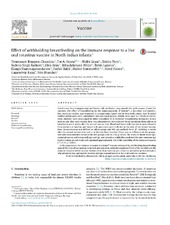Effect of withholding breastfeeding on the immune response to a live oral rotavirus vaccine in North Indian infants
Rongsen-Chandola, Temsunaro; Strand, Tor A.; Goyal, Nidhi; Flem, Elmira; Singh Rathore, Sudeep; Arya, Alok; Winje, Brita Askeland; Lazarus, Robin; Shanmugasundaram, Elango; Babji, Sudhir; Sommerfelt, Halvor; Vainio, Kirsti; Kang, Gagandeep; Bhandari, Nita
Peer reviewed, Journal article
Published version
Permanent lenke
https://hdl.handle.net/1956/9630Utgivelsesdato
2014-08-11Metadata
Vis full innførselSamlinger
Originalversjon
https://doi.org/10.1016/j.vaccine.2014.04.078Sammendrag
Interference from transplacental and breast milk antibodies may impede the performance of oral livevaccines. The effect of breastfeeding on the immunogenicity of Rotarix®, a two-dose oral monova-lent rotavirus vaccine, was examined in a community-based trial in New Delhi, India. Four hundredmother–infant pairs were randomized into two equal groups. Infants were aged 6–7 weeks at enroll-ment. Mothers were encouraged to either breastfeed or to withhold breastfeeding during the 30 minprior to and after each vaccine dose was administered. We collected blood specimens from infants atenrollment and 4 weeks after the second vaccine dose. Blood and breast milk specimens were obtainedfrom mothers at baseline and breast milk specimens were collected at the time of the second vaccinedose. Seroconversion was defined as infant serum anti-VP6 IgA antibody level of ≥20 IU/mL 4 weeksafter the second vaccine dose and a ≥4-fold rise from baseline. There was no difference in the propor-tion who seroconverted between the two groups (26% vs 27%; p = 0.92). The levels of infant serum IgA,maternal serum and breast milk IgA and IgG anti-rotavirus antibodies predicted the anti-rotavirus IgAlevel in infants at end-study and explained approximately 10% of the variability of the immune response(r2= 0.10, p < 0.001). In this population, the immune response to Rotarix®was not enhanced by withholding breastfeedingaround the time of vaccination. Maternal anti-rotavirus antibodies explained little of the variability in theimmune response to the vaccine. Factors other than maternal anti-rotavirus antibodies probably explainwhy infants in low-and middle-income settings respond poorly to live oral rotavirus vaccines.

